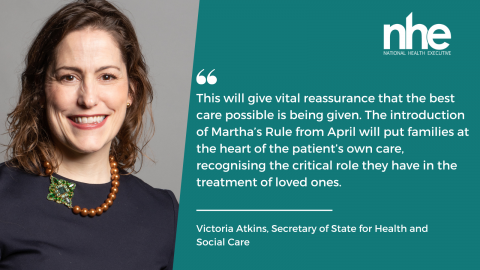NHS England (NHSE) has announced that at least 100 sites will roll-out Martha’s Rule from April, in a bid to sure up treatment and improve patient safety.
Martha’s Rule gives the families of patients the ability to trigger an independent review from a critical care team if they are worried the condition of a loved one is deteriorating.
Though ultimately subject to government funding, NHSE says that an evaluation of the launch could inform proposals to roll-out Martha’s Rule to all acute hospitals in the future.
A similar model could also be implemented across community and mental health sites, with the NHS looking to identify how a slightly adapted Martha’s Rule would work across other settings.

NHS staff will be expected to consult the families of patients to formally record daily insights and ensure any changes in behaviour or condition of the patient are noted.
Martha’s Rule will be available on a 24/7 basis to patients, their families as well as NHS staff.
The move is a “great step forward” in the way the NHS listens to patients and their families, according to England’s patient safety commissioner, Dr Henrietta Hughes.
Sir Julian Hartley, chief executive at NHS Providers, says that healthcare “should always be a partnership” between patients, their families and clinicians.
He adds: "Martha's Rule will support positive ways of working and continuous improvement. We look forward to the evaluation of the initial roll-out, and consideration of how the approach could also inform care across the wider NHS.”
Martha’ Rule is named after Martha Mills, who died in 2021 after developing sepsis while in hospital for a pancreatic injury sustained falling off her bike.
A 2022 coroner’s report concluded that, if the concerns of Martha’s family were responded to more promptly, and Martha was transferred to intensive care earlier, she probably would have survived.
Martha’s parents, Merope Mills and Paul Laity, say: “We believe Martha’s Rule will save lives. In cases of deterioration, families and carers by the bedside can be aware of changes busy clinicians can’t; their knowledge should be recognised as a resource.”
They add: “We also look to Martha’s Rule to alter medical culture: to give patients a little more power, to encourage listening on the part of medical professionals, and to normalise the idea that even the grandest of doctors should welcome being challenged.”
Image credit: iStock



















